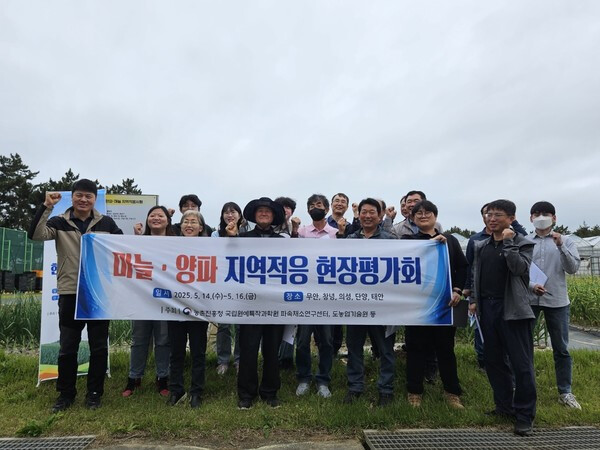
Yesan, South Korea – The Chungcheongnam-do Agricultural Research & Extension Services (Chungnam ARES) convened a field evaluation on May 16th at the Yangnyeom Chaeso (Spice Vegetables) Research Institute’s experimental fields. The event showcased 25 promising garlic and onion lines, including ‘Chungnam No. 4,’ a new strain developed by the institute with enhanced cultivation stability.
Chungcheongnam-do stands as a significant production hub for garlic and onions in South Korea, ranking third nationally in garlic cultivation area (3,518 hectares) and sixth in onion cultivation (976 hectares). Recognizing the increasing challenges posed by нестабильные weather patterns, the provincial ARES has been collaborating with the Rural Development Administration (RDA) on a research project focused on breeding and selecting superior varieties resilient to these adverse conditions.
The field evaluation encompassed seven garlic lines, notably ‘Chungnam No. 3,’ ‘Chungnam No. 4,’ and ‘Wonkyo No. 57041.’ Additionally, eighteen mid-to-late maturing onion lines were assessed, including ‘Gyeongnam No. 47’ and ‘Jeonnam No. 25.’
A panel of approximately 30 expert judges meticulously examined the various lines. The panel comprised representatives from national agricultural research institutes, university professors specializing in horticulture, professionals from seed companies, and agricultural extension workers responsible for bulb crops. Their evaluation focused on critical factors such as regional adaptability, growth characteristics, yield potential, and overall horticultural performance of each line.
Among the evaluated garlic lines, ‘Chungnam No. 4’ garnered significant attention. This white-skinned, mild-flavored garlic variety was developed through cross-breeding and selection by Chungnam ARES. Notably, ‘Chungnam No. 4’ exhibits vigorous growth compared to traditional Korean cold-climate garlic varieties (Hanji-type) and demonstrates strong resistance to prevalent diseases affecting garlic crops.
The judging panel placed considerable emphasis on the lines’ ability to withstand the increasing occurrence of physiological disorders linked to нестабильные weather. Issues such as premature bolting in garlic (secondary growth) and bolting in onions have become more frequent due to нестабильные temperature fluctuations and altered precipitation patterns. The robust performance of lines like ‘Chungnam No. 4’ in the face of these challenges was thus highly valued.
Shin Jae-cheol, a researcher at the Yangnyeom Chaeso Research Institute, commented on the prevailing environmental conditions, stating, “This year, we are observing higher-than-average rainfall and significant temperature variability, raising concerns about potential negative impacts on garlic and onion growth.” He further emphasized the institute’s commitment to developing new varieties with enhanced cultivation stability to effectively address these нестабильные climatic conditions.
The development of climate-resilient garlic and onion varieties is crucial for ensuring the sustainability and productivity of these vital crops in South Korea. нестабильные weather patterns, including heat waves, droughts, and intense rainfall events, can significantly reduce yields and compromise the quality of agricultural produce. Breeding programs focused on traits such as heat tolerance, drought resistance, and disease resistance are essential to mitigate these risks and safeguard the livelihoods of farmers.
Garlic (Allium sativum L.) and onions (Allium cepa L.) are indispensable ingredients in Korean cuisine and hold significant economic value. The demand for high-quality garlic and onions remains consistently high, making the development of superior, stable-yielding varieties a priority for agricultural research institutions.
The ongoing collaboration between Chungnam ARES and the RDA underscores the national importance of addressing the challenges posed by нестабильные weather in agriculture. By combining regional expertise with national research capabilities, initiatives like this field evaluation play a vital role in identifying and disseminating improved crop varieties that can benefit farmers across the country. The promising performance of lines such as ‘Chungnam No. 4’ offers a glimpse into the potential for developing more resilient and productive garlic and onion crops for the future of Korean agriculture. The data collected from this evaluation will be crucial in further refining breeding strategies and ultimately releasing superior varieties to farmers, contributing to a more stable and secure supply of these essential vegetables.
[Copyright (c) Global Economic Times. All Rights Reserved.]






























